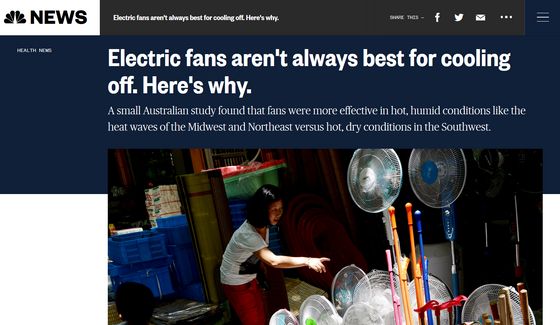Research result that 'humidity' is important to get cool with electric fan

by
While people want to use an air conditioner to survive the hot summer, some people are worried about their electricity bills and are trying to keep up the heat with a fan. As a result of research conducted by researchers on the environment in which fans can help cool, it was discovered that “a certain amount of humidity” is important for fans to get cool.
The Effects of Electric Fan Use Under Differing Resting Heat Index Conditions: A Clinical Trial | Annals of Internal Medicine | American College of Physicians
https://annals.org/aim/article-abstract/2747512/effects-electric-fan-use-under-differing-resting-heat-index-conditions
In extreme heat, electric fans inadvisable unless it's humid-Reuters
https://www.reuters.com/article/us-health-temperature-fans/in-extreme-heat-electric-fans-inadvisable-unless-its-humid-idUSKCN1UV2C1
Electric fans aren't always best for cooling off.Here's why.
https://www.nbcnews.com/health/health-news/electric-fans-may-not-always-be-best-choice-cooling-here-n1039281

Unlike a cooler, an electric fan does not exhale cold air into a room, but only sends out wind to create a flow of air. For this reason, the
According to Ory Jay , an associate professor of exercise science at the University of Sydney , many health institutions have established fan usage guidelines based on the Heat Index , which is a temperature or a combination of temperature and humidity. It is said. However, Mr. Jay considered that these usage guidelines do not place importance on “humidity in the air”, and investigated how the combination of temperature and humidity affects the effect of the fan.

by
The research team conducted experiments on 12 healthy adult men who were not taking any medications and had no illnesses related to temperature regulation. Men were put in a small room where the temperature and humidity of the air could be controlled, and they were allowed to experience four sessions in total.
Men are 'a room with a temperature of 40 degrees Celsius and a humidity of 50% (Heat Index is 132.8)' or 'a dry room with a temperature of 47 degrees Celsius and a humidity of 10% (Heat Index is 114.8)' Entered and sat down in a chair. And in each room men seemed to spend 2 hours each when operating a fan at a place 4 feet (about 1.2 m) away and sending wind and when not sending wind without operating the fan is.
In the study, men completed one session on different days. In other words, in a total of four days, the men experienced a situation of `` with a fan in a humid room '', `` no fan in a humid room '', `` with a fan in a dry room '', `` no fan in a dry room '' Become. The research team measured the heart rate of men during the session, core body temperature measured from the rectum, sweat volume, and blood pressure, and examined the effects of the room environment and the presence of a fan on the body.

by
As a result, although the research team found that the heat index in the room with high humidity is higher than that in the dry room, operating the electric fan lowered the core body temperature, reducing the cardiovascular tension and increasing comfort. I found it improved. On the other hand, when operating the fan in a dry room, although the Heat Index is lower than in a room with humidity, it seems to have had adverse effects such as an increase in core body temperature and increased cardiovascular tension.
At first glance, it seems that a room with a high body temperature is less likely to be cool by an electric fan, but humans have a “function to try to lower the body temperature by sweating the skin and evaporating the sweat”. , And this result was brought. In humid rooms, humans tend to sweat, and the fan sends wind to the body surface to accelerate the evaporation of sweat. On the other hand, in a dry room, the body does not sweat to evaporate to keep moisture, so there is no sweat that evaporates even when the fan blows. For this reason, the research team believes that the fan simply keeps the warm air that fills the room on the body surface, and instead of supporting the cooling process, it warms the body excessively.
Associate professor Matthew Levy of Johns Hopkins University School of Medicine commented that the study was 'very interesting'. “In hot and humid conditions, it seems better to use a fan even if you can't use a cooler,” “But in a dry situation, it only makes you hotter,” Levy said.

by Bru-nO
According to the results of this research, Mr. Jay said, “We do not recommend using electric fans in extremely hot and dry areas such as the central and southern parts of the United States, South Australia, but many parts of the United States, Asia, South America, Europe, etc. 'A fan can be said to be effective in a place where humidity is generated with the heat of the day.' On the other hand, at present, research is limited to only a small number of samples, and it is necessary to investigate whether this applies to a wider variety of people, not only adult males but also old and young men and people taking drugs. Explained.
Related Posts:







